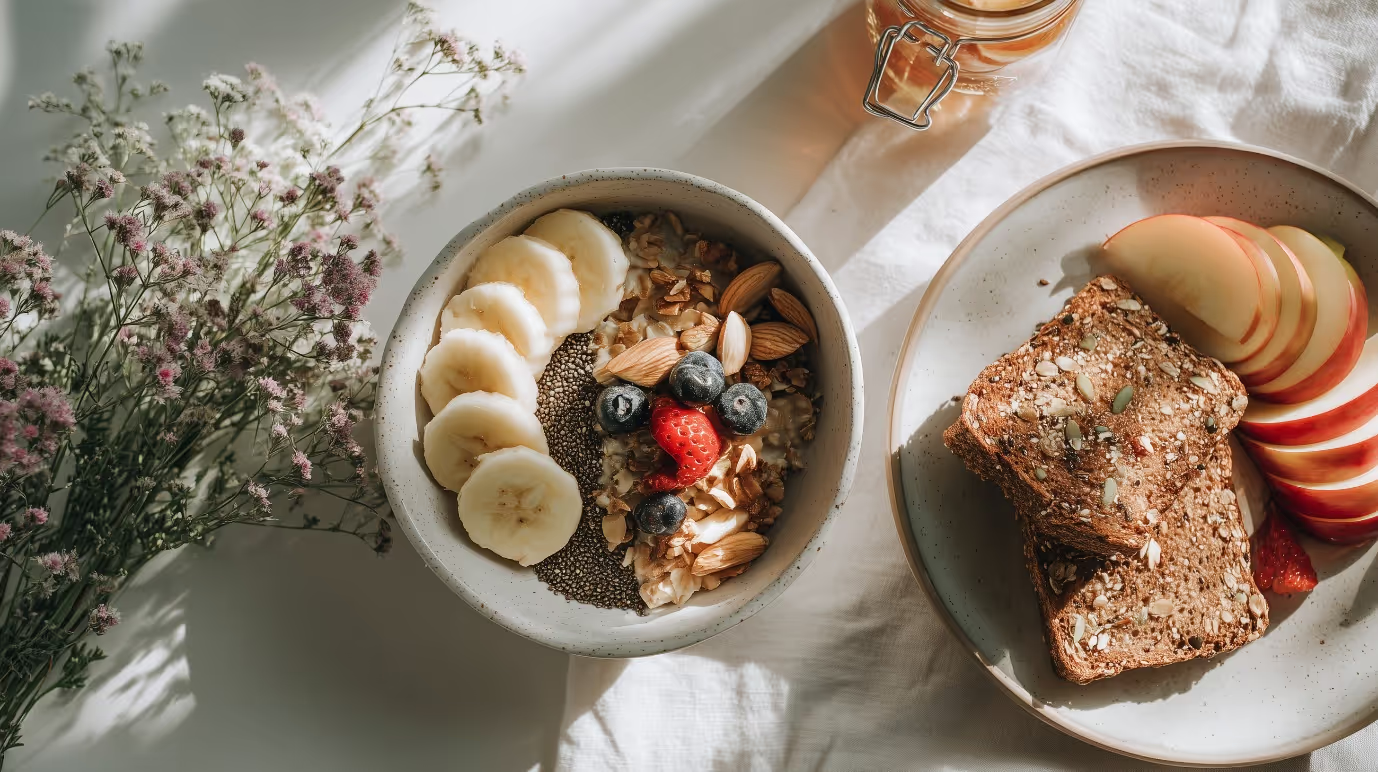
When it comes to nutrition, protein often gets the spotlight, healthy fats have their advocates, and carbohydrates spark endless debates. But there’s one dietary component quietly working behind the scenes to keep your body running smoothly — fibre. While it doesn’t provide calories or vitamins, its role in your digestive system, heart health, and overall wellbeing is nothing short of essential.
Eating fibre-rich foods such as fruits, vegetables, whole grains, and legumes into your diet is crucial for digestive health and disease prevention.
In this article, we’ll explore the health benefits of dietary fibre, the different types, how much you should aim for, and practical tips for boosting your fibre intake.
Absolutely — in fact, it’s vital. Unlike some nutrients that can be stored in your body, dietary fibre works best when consumed regularly. Daily intake helps keep your digestive tract moving, supports gut health, stabilizes blood sugar levels, and can contribute to maintaining a healthy weight.
Most people don’t get enough fibre. A diet low in plant foods like fruits and vegetables, whole grains, and legumes often leads to sluggish digestion, blood sugar spikes, and even imbalances in your gut bacteria. Eating foods rich in fibre, such as whole grains, fruits, vegetables, nuts, and seeds, is important for supporting overall health. Eating fibre every day keeps these systems running in harmony.
Gradually adding more fiber to your diet can help you experience the full range of health benefits, including better digestion and reduced risk of chronic diseases.
The benefits of increasing dietary fibre go far beyond simply avoiding constipation. Consuming a variety of dietary fibre from natural plant foods supports digestive health, helps relieve constipation by promoting regular bowel movements, and provides numerous other health benefits. Here are some science-backed reasons to make it a daily priority:
1. Supports Digestive Health
Fibre adds bulk to stool and helps relieve constipation by promoting regular bowel movements and supporting efficient movement of food through your gastrointestinal tract. Insoluble fibre is particularly effective at this.
2. Feeds the “Good” Bacteria in Your Gut
Certain types of soluble fibre and resistant starch act as prebiotics — food for your beneficial gut bacteria. When these bacteria ferment fibre, they produce short chain fatty acids, which help maintain a healthy gut lining and support your immune system.
3. Helps Prevent Blood Sugar Spikes
Fibre slows the absorption of sugars into your bloodstream, preventing rapid blood glucose rises after meals. This makes it particularly valuable for people managing insulin resistance or aiming for stable energy throughout the day.
4. Lowers LDL Cholesterol
Some fibres, especially soluble fibre, bind to cholesterol in your digestive system and help remove it from the body, which can lower blood cholesterol—including LDL cholesterol—and support a healthy heart.
5. Supports a Healthy Weight
High-fibre foods are generally more filling, helping to reduce overall calorie intake without feeling deprived. This is one reason high fibre diets are often part of successful weight loss strategies.
6. Promotes Cardiovascular Health
By lowering cholesterol and supporting healthy blood pressure, fibre plays a role in reducing the risk of heart disease and maintaining strong cardiovascular function.
Not all fibre is the same. Dietary fibres are generally categorized as soluble fiber and insoluble fiber, each offering unique health benefits. Different types have unique functions, and a balanced diet should include both.
Soluble Fibre
Insoluble Fibre
Functional Fibres
How Much Dietary Fibre Do You Need?
The dietary reference intakes suggest that adults aim for 25–38 grams of fibre per day, depending on age and gender. Understanding how much dietary fiber you need is important for optimal health, as adequate intake supports digestive health and reduces the risk of chronic diseases. Many people consume far less than this recommended amount, with average dietary fiber intake falling short of guidelines, so increasing fibre intake should be a conscious goal.
A good rule of thumb is to fill half your plate with fruits and vegetables, choose whole grain foods over refined ones, and include legumes or nuts daily. Knowing how much fiber you need and making high-fiber choices can help with weight management by promoting satiety and supporting adherence to caloric restrictions.
To boost your fiber intake, it's important to choose a variety of fiber-rich foods every day. Here are some fibre-rich options to help you meet your daily needs:

If you’re aiming to manage your weight, fibre can be your best ally. By increasing satiety, high fibre foods make it easier to maintain a calorie restricted diet without feeling constantly hungry. Increased dietary fiber intake supports adherence to calorie restricted diets by promoting a lasting feeling of fullness. Soluble fibres, in particular, slow digestion, helping you feel full for longer.
Your digestive system houses trillions of bacteria, collectively known as the gut microbiome. A diet rich in fibre helps maintain a diverse and healthy microbiome by providing the fuel these microbes need to thrive. The result? Better digestion, improved nutrient absorption, and even potential benefits for mood and mental wellbeing.
Fibre intake can also help manage symptoms of irritable bowel syndrome and inflammatory bowel disease by supporting gut health and reducing inflammation. Additionally, the fermentation of dietary fibre produces short chain fatty acids and can influence the metabolism of amino acids in the gut.
Multiple studies link high fibre diets with a lower risk of coronary heart disease. Soluble fibre in particular helps reduce LDL cholesterol levels, while the anti-inflammatory effects of short chain fatty acids contribute to cardiovascular protection. Dietary fibre, especially soluble fibre, can help lower blood cholesterol and reduce the risk of high blood pressure, both of which are important for heart health.
While soluble fibre works on regulating blood sugar and cholesterol, insoluble fibre keeps your digestive tract moving efficiently. A balanced intake of both types ensures comprehensive benefits.
For example:
Fibre Supplements: When Are They Useful?
While it’s always best to get fibre from whole foods, taking fiber supplements, such as a fiber supplement like psyllium husk, can help increase fiber intake when dietary sources are insufficient. They can assist in lowering LDL cholesterol, improving bowel regularity, and supporting blood sugar control.
Fiber supplements can also be useful for managing digestive issues or supporting cholesterol reduction. However, supplements shouldn’t replace a diet rich in plant foods — they work best as a complement.
Can You Have Too Much Fibre?
Yes. While fibre is beneficial, consuming significantly more than the recommended amount can cause bloating, gas, and discomfort. If you’re increasing fibre intake, do so gradually and drink plenty of water to help your body adjust.
To start increasing fiber intake, do so gradually to allow your digestive system to adjust.
For those monitoring their blood glucose levels, fibre is a game-changer. Soluble fibre slows the release of sugar into the bloodstream, preventing rapid spikes and supporting insulin sensitivity. This makes it an important part of dietary strategies for managing blood pressure, LDL cholesterol, and overall metabolic health.
From supporting digestion to reducing the risk of heart disease, fibre truly is an unsung hero in everyday nutrition. By choosing fibre-rich foods, balancing soluble and insoluble fibres, and staying consistent with your intake, you can support your body’s systems from the inside out.
Remember to monitor your fibre intake to ensure you are meeting daily recommendations for optimal health.
A growing body of research highlights the powerful role of dietary fibre intake in reducing the risk of colorectal cancer. Both soluble and insoluble fibers contribute to this protective effect, but they work in different ways. Soluble fibres, found in foods like fruits, vegetables, and whole grains, help slow digestion and may reduce the formation of harmful compounds in the colon. Insoluble fibres, abundant in whole grains and wheat bran, add bulk to stool and speed up its passage through the digestive system, which means potential carcinogens spend less time in contact with the colon wall.
One of the key health benefits of dietary fibre in this context is the production of short chain fatty acids, such as butyrate, during the fermentation of fibre by gut bacteria. These fatty acids have anti-inflammatory properties and support healthy cell growth and differentiation in the colon, significantly lowering risk of colorectal cancer, according to multiple studies. By prioritizing a high fibre diet rich in both soluble and insoluble fibers, you can harness these important health benefits and support your digestive system’s long-term wellbeing.
Fibre and Blood Pressure: What’s the Connection?
Emerging evidence suggests that a high fibre diet can play a significant role in maintaining healthy blood pressure and reducing the risk of cardiovascular disease. Soluble fibers, such as those found in oats, barley, and many fruits, help bind to bile acids and remove them from the body, which can lower cholesterol levels and improve overall blood lipid profiles. Additionally, when dietary fibre is fermented in the gut, it produces short chain fatty acids that help relax blood vessels and improve circulation, contributing to lower blood pressure.
To reap these benefits, focus on increasing your fibre intake with high fibre foods like whole grains, fruits, and vegetables. If you find it challenging to meet your needs through food alone, fibre supplements can be a helpful addition. However, it’s important to increase fibre gradually to avoid digestive discomfort, as too much fiber too quickly can overwhelm your digestive system. By making fibre a regular part of your diet, you support not only your digestive health but also your cardiovascular wellbeing.
Dietary fibre consumption varies widely around the world, and these differences have a real impact on public health. In many cultures where traditional diets are based on whole grains, fruits, and vegetables, people naturally enjoy the health benefits of dietary fibre, including a lower risk of heart disease and colorectal cancer. For example, populations in parts of Africa and Asia often have higher fibre intake thanks to meals centered around unprocessed plant foods and whole grains.
In contrast, Western diets tend to be lower in dietary fibre and higher in processed foods, which can contribute to a range of chronic health issues. The benefits of dietary fibre are clear, yet many people in these societies fall short of recommended intake levels. Raising awareness about the health benefits of dietary fibre and making high fibre foods more accessible can help shift dietary habits and reduce the burden of chronic diseases. Embracing more fruits and vegetables, whole grains, and other high fibre foods is a simple yet powerful step toward better health for individuals and communities alike.
This content is for general informational purposes only and is not a substitute for professional medical advice. Always consult with a qualified healthcare provider before making changes to your diet or lifestyle, especially if you have existing health conditions.
Join The Hub community. Subscribe today and receive a monthly email with our newest blogs and articles on health, wellness, and nutrition to keep you informed and inspired.
By signing up you agree to our User Agreement and Privacy Policy & Cookie Statement

By accessing, browsing, or using this website (the “www.newimage.world/thehub”), you acknowledge and agree to the terms of this Disclaimer. The Website, including its blogs, podcasts, videos, and any other content (collectively, the “Content”), is operated by New Image™ International (“the Company,” “we,” “our,” or “us”).
All Content made available on this Website is provided strictly for general informational and educational purposes only. The Content does not constitute, and should not be relied upon as, medical advice, diagnosis, treatment, prescription, or professional health consultation of any kind.
The Company makes no representations or warranties regarding the accuracy, completeness, reliability, or timeliness of the Content. The Content may include information collected from external or third-party sources, and we do not independently verify such information. Accordingly, no nutritional, health, or wellness claims are endorsed, warranted, or guaranteed by the Company.
To the fullest extent permitted by applicable law:
Your use of the Website does not establish any doctor–patient, nutritionist–client, or other professional relationship between you and the Company or any of its representatives.
The Website may include references, links, or access to third-party websites, podcasts, or resources. The Company does not control, endorse, or assume any responsibility for such third-party content and shall not be held liable for any damages arising from your use of or reliance on it.
By clicking “Accept” on the Website’s pop-up disclaimer, you expressly acknowledge that you have read, understood, and agreed to be bound by this Disclaimer. Your continued use of the Website constitutes ongoing acceptance of these terms. If you no longer agree with this Disclaimer, you must immediately discontinue use of the Website.
Join The Hub community. Subscribe today and receive a monthly email with our newest blogs and articles on health, wellness, and nutrition to keep you informed and inspired.
By signing up you agree to our User Agreement and Privacy Policy & Cookie Statement
